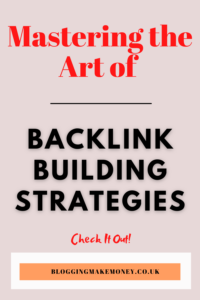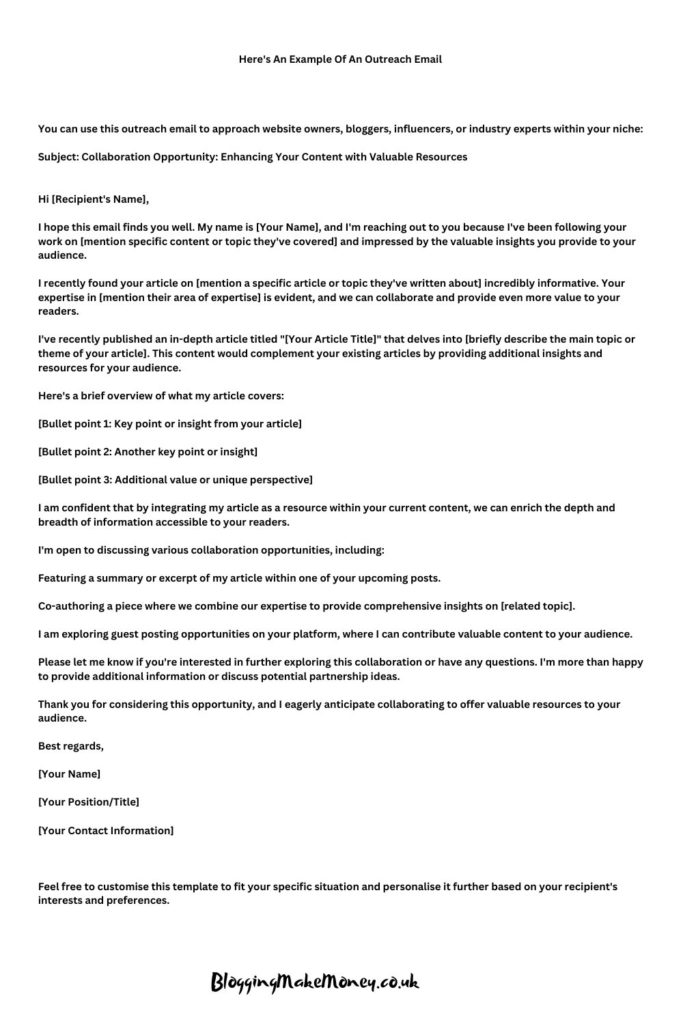Mastering the Art of Backlink Building Strategies
In the ever-evolving digital marketing landscape, mastering the art of backlink building strategies remains a crucial endeavour for website owners and marketers alike. Backlinks are essential endorsements from other websites, signalling your content’s credibility and relevance to search engines. However, in an era where search engine algorithms are becoming increasingly sophisticated, acquiring backlinks has evolved as a proven strategy for elevating your website’s authority through strategic backlink building.
From crafting compelling outreach emails to leveraging social proof and utilising data-driven analysis tools, we uncover actionable tactics to help you navigate the complex terrain of link acquisition and propel your website to new heights of visibility and influence. Whether you’re a seasoned marketer seeking to refine your approach or a newcomer looking to establish a solid foundation, this article offers invaluable insights to fuel your journey towards backlink mastery.

Killer Strategy To Get Your Article on No. 1 On Search Result
If I had to choose one killer strategy to quickly improve the ranking of an article to No. 1 in Google search results within a month, it would have to be backlink building. Having backlinks from high-quality and relevant websites is crucial in improving your search engine ranking. It’s important to note that search engines consider backlinks as a positive endorsement of your content’s value and credibility. This insight can help you focus on creating quality content that others will want to link to, ultimately driving more traffic to your website. Therefore, building relationships with authoritative websites in your niche is essential to obtain high-quality backlinks and enhance your website’s online visibility.
Here’s how you can execute this strategy effectively:
- Identify High-Quality Websites: Getting backlinks from authoritative sources is crucial for building your website’s online presence. To boost your search engine ranking and build credibility in your sector, choose high-quality websites in your industry related to your content and concentrate on obtaining backlinks from them.
- Outreach and Networking:
- Connecting with website owners, bloggers, influencers, and industry experts in your niche can help you grow your online presence. Take the initiative to start a conversation and explore new opportunities for your business.
- Create Link-Worthy Content: It is crucial to conduct thorough research and produce comprehensive content that offers unique value to your readers if you aim to attract backlinks naturally. Exceptional content is more likely to receive backlinks from other websites, which can enhance your search engine rankings and online presence. Therefore, it is essential to focus on creating informative and well-researched articles that provide value to your target audience.
- Utilise Content Promotion: Promote your article across social media, forums, and online communities to increase its visibility. The more people see your content, the higher the chances of earning backlinks.
- Monitor and Track Progress: Use tools like Google Analytics and backlink analysis tools to monitor the acquisition of backlinks and their impact on your ranking.
While backlink building strategies can be a powerful SEO tactic, it’s important to complement them with other optimisation efforts for sustained success. Remember to focus on acquiring high-quality backlinks from reputable sources rather than resorting to spammy or black-hat tactics, as they can harm your website’s reputation and ranking in the long run.
How To Acquire High-quality Backlinks From Reputable Sources
Here’s a step-by-step action plan to focus on acquiring high-quality backlinks from reputable sources:
Research Relevant Websites:
Identify websites within your niche with solid domain authority and considered authoritative sources of information. Look for websites that have a history of linking to quality content and appear to have a genuine interest in providing valuable resources to their audience.
Create Link-Worthy Content:
Develop comprehensive content that addresses common pain points, provides solutions, or offers unique insights within your niche. Ensure your content is well-researched, well-written, and provides value to your target audience.
Perform Competitor Analysis:
Analyse your competitors’ backlink profiles to identify websites linking to similar content. Look for opportunities to approach these websites for backlinks by offering even more valuable or updated content.
Utilise Outreach Strategies:
Craft personalised outreach emails to website owners, bloggers, influencers, and industry experts within your niche. Describe the significance of your content for their audience and how it enhances their current content. Propose collaboration opportunities such as contributing guest posts or suggesting your content as a valuable resource to be incorporated into their existing articles.

Leverage Social Proof:
Highlight any relevant credentials, accolades, or achievements demonstrating your expertise in the subject matter. Share testimonials or case studies from satisfied readers or clients to showcase the value of your content.
Monitor and Follow-Up:
Maintain a record of your outreach endeavours and follow up with recipients who have yet to respond after a reasonable period. Show persistence while remaining respectful in your follow-ups, and be ready to offer further details or address any queries they might have.
Diversify Your Backlink Profile:
Aim for diverse backlinks from various sources, including blogs, news sites, industry directories, and reputable forums. Avoid relying too heavily on one type of backlink source to ensure a natural and balanced backlink profile.
Track and Analyze Results:
Monitoring your website’s backlinks is crucial, and you can achieve this by using tools like Google Analytics, Google Search Console, and backlink analysis tools. These resources offer valuable insights into your backlink profile, helping you to analyse the quality and quantity of backlinks pointing to your website. This enables you to make informed decisions to improve your site’s performance. This allows you to assess the impact of these backlinks on your website’s ranking. Analyse which outreach strategies and tactics yield the best results and adjust your approach accordingly. Following this action plan and consistently acquiring high-quality backlinks from reputable sources can improve your website’s authority and enhance its ranking in search engine results.
Utilise Outreach Strategies:
Craft personalised outreach emails to website owners, bloggers, influencers, and industry experts within your niche. Provide a rationale for why your content holds value for its audience and how it seamlessly complements its current content. Extend invitations for collaboration, offering options such as contributing guest posts or proposing including your content as a supplementary resource within their existing articles.
Here’s An Example Of An Outreach Email

Feel free to customise this template to fit your specific situation and personalise it further based on your recipient’s interests and preferences.
How do I Track and Analyze Results?
Here’s a step-by-step guide on how to use Google Analytics, Google Search Console, and backlink analysis tools to track and analyse the results of your backlink-building efforts:
Set Up Google Analytics:
To obtain valuable insights into your website’s performance, it’s advisable to establish a Google Analytics account and integrate the tracking code onto your website. If you still need to take this step, I highly recommend doing so.
By setting up Google Analytics and incorporating the tracking code, you’ll gain access to crucial data regarding your website’s traffic and user interactions. This information will serve as a foundation for refining your marketing strategies and optimising your website. Navigate to the “Acquisition” section in Google Analytics to monitor traffic sources, including referral traffic from backlinks.
Monitor Referral Traffic:
In Google Analytics, go to “Acquisition” > “All Traffic” > “Referrals” to view the websites that are sending traffic to your site through backlinks. Examine the referral traffic metrics, such as session count, bounce rate, and average session duration, to assess the calibre of traffic from each origin.
Related articles:
How To Improve Keyword Rankings
Unlocking The Secrets Of Profitable Blogging
Sponsored Post Secrets For Social Media Stardom
Unlocking The Secrets Of Profitable Blogging
Analyse
Review Search Console Data:
Access Google Search Console and verify ownership of your website. Navigate to the “Links” section to view the websites linking to your site that provide insights into your backlink profile and help you identify new backlinks acquired over time.
Analyse Backlink Quality:
Use backlink analysis tools like Ahrefs, Moz Link Explorer, or SEMrush to evaluate the quality and authority of websites linking to your site. Examine metrics like domain authority, page authority, and spam score to gauge the credibility of each backlink source.
Track Keyword Rankings:
Monitor changes in keyword rankings for your target keywords using tools like Ahrefs, SEMrush, or Google Search Console. Keep track of how your rankings evolve, especially for keywords associated with the content you’re building backlinks to.
Measure Impact on Organic Traffic:
Use Google Analytics to track changes in organic traffic to your website over time. Compare organic traffic metrics before and after implementing your backlink building strategies to assess their impact on overall website visibility.
Monitor Conversion Metrics:
Measure the effectiveness of your backlink building strategies by tracking conversions like leads, sales, or other desired actions. Analyse conversion data to identify which backlink sources drive the most valuable traffic and engagement.
Regularly Review and Adjust Strategies:
Continuously monitoring the performance of your backlink-building efforts is crucial. By staying vigilant and regularly assessing the impact of your strategies, you can gather valuable insights that inform necessary adjustments. This proactive approach ensures you can adjust and refine your tactics to maximise effectiveness and accomplish your goals.
Identify which tactics generate the best results and allocate more resources to those strategies while refining or discontinuing less effective approaches. By following these steps and consistently analysing the data provided by Google Analytics, Google Search Console, and backlink analysis tools, you can gain valuable insights into the effectiveness of your backlink-building efforts. To help you optimise your strategy for improved results.

Conclusion
Becoming proficient in building backlink strategies entails more than just acquiring links; it involves strategically nurturing relationships, providing value, and earning recognition within your niche.
By following these strategies, you can create meaningful connections with influential figures in your industry, enhance the credibility of your content, and ultimately elevate your website’s authority in the eyes of both search engines and visitors. Remember that mastering the art of building backlinking strategies demands patience, perseverance, and a commitment to providing exceptional value to your audience.
Therefore, leverage collaboration opportunities, remain informed about current trends and industry standards, and consistently improve your strategy by leveraging data-driven insights. You can position your website as a reliable authority within your niche through dedicated and strategic efforts, paving the way for growth and success in the dynamic digital environment.
Cracking The Code: Sponsored Post Secrets For Social Media Stardom!
Frequently Asked Questions and Answers
What are the different strategies to create backlinks?
Guest Blogging: Contribute high-quality content to other websites in your niche, including a backlink to your site in your author biography and within the content.
Broken Link Building: A great way to get backlinks for your content is to identify any broken links on high-authority websites and offer your content as a substitute. Doing this can help you gain valuable backlinks while solving the website owner’s broken link problem.
Resource Link Building: Create valuable resources, such as guides, infographics, or tools, and reach out to relevant websites to suggest they link to your resource, providing value to their audience. [3]
What are the types of backlinks?
- Natural Backlinks: Earned organically through the merit of your content, products, or services.
- Manual Outreach Backlinks: Secured through proactive outreach to other website owners or bloggers, often in exchange for guest posts or collaborations.
- Self-created Backlinks: Generated content, such as forum signatures, blog comments, and social media profiles, is generally considered lower quality.
- Editorial Backlinks: This is when other websites link to your content organically because it is valuable and relevant to their audience, without your solicitation or intervention. Editorial backlinks are typically considered the most valuable due to their genuine nature and indication of high-quality content.
Types of Link Building
- Broken link-building strategy
- Guest blogging
- Unlinked mentions
- Social media
- Build links from outdated resources
- Infographic
- Provide testimonials
- Replicate your competitor’s best links
- Write guest posts
- Authority resource pages
- Broken backlinks
- Build links with images
- Create linkable assets
- Create roundup posts
How can I build backlinks?
Create High-Quality Content: Create valuable content that is informative, engaging, and shareable to attract links from other websites naturally.
Guest Posting: Contribute guest posts to reputable websites in your industry, including a backlink to your site in the author bio or within the content.
Broken Link Building: Search for broken links within websites relevant to your niche. An effective way to fix a broken link is to proactively reach out to the website owners or administrators and suggest content that could replace the broken link. You can secure a backlink to your content by providing a valuable alternative.
Outreach: Reach out to bloggers, journalists, and website owners in your niche, offering them valuable content or resources in exchange for a backlink.
Participate in Online Communities:
- Participate in online communities related to your industry.
- Share your content.
- Build relationships that may lead to backlinks.
Utilize Social Media: A great way to expand the reach of your content is by leveraging social media channels. Utilizing these platforms to distribute and promote your content can significantly enhance its exposure and increase the chances of others linking to it.
Create Linkable Assets: Develop unique and valuable resources, such as guides, infographics, or tools, that other websites will want to link to.
Monitor Competitors: Examine the sources from which your competitors acquire their backlinks and contemplate reaching out to those same outlets, highlighting the importance of quality over quantity in your backlink strategy, striving to obtain links from reputable and pertinent websites.

